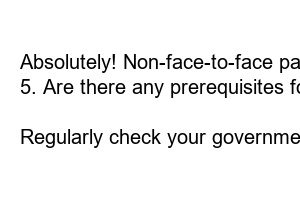주민등록 사실조사 비대면 참여
Title: The Rise of Non-Face-to-Face Participation in Resident Registration Fact-Finding
Introduction:
In today’s technologically advanced world, traditional face-to-face interactions are gradually being replaced by virtual alternatives. This shift is not limited to socializing or business transactions but also extends to government processes. One such process that has experienced a significant transformation is resident registration fact-finding, where non-face-to-face participation is gaining momentum.
1. The Evolution of Resident Registration Fact-Finding:
Resident registration, an essential process for upholding social order, was previously conducted through physical visits to designated government offices. This time-consuming and inconvenient method is being overhauled by innovative alternatives.
2. The Boon of Technology:
Advancements in technology have paved the way for non-face-to-face participation in resident registration fact-finding. The utilization of secure online platforms or smartphone applications streamlines the process, minimizing the need for individuals to visit physical offices.
3. Convenience Redefined:
Non-face-to-face participation in resident registration fact-finding offers a significant advantage – convenience. People can complete necessary registration processes without leaving the comfort of their homes, saving time and effort.
4. Ensuring Security and Privacy:
Amid concerns about cyber threats and privacy breaches, one might question the safety of engaging in non-face-to-face resident registration fact-finding. However, government authorities are implementing stringent security measures and robust encryption protocols to safeguard citizens’ information.
5. Bridging the Urban-Rural Gap:
Non-face-to-face participation in resident registration fact-finding is particularly valuable in bridging the gap between urban and rural areas. Citizens residing in remote or distant parts of the country can now easily complete their registration and access necessary services.
6. The Importance of Public Awareness and Acceptance:
Promoting awareness and encouraging public acceptance is vital to the success of non-face-to-face participation in resident registration fact-finding. Governments must adopt comprehensive strategies to educate citizens about the benefits, security measures, and procedures of this transformative approach.
7. The Way Forward:
Non-face-to-face participation in resident registration fact-finding is undoubtedly reshaping the landscape of administrative processes. With technological advancements poised to continue, governments must embrace innovation and continuously evolve to meet the changing needs of their citizens.
Summary:
As technology continues to revolutionize various aspects of our lives, non-face-to-face participation in resident registration fact-finding emerges as a game-changer. By leveraging online platforms and smartphone applications, this transformative approach offers convenience, bridges geographical gaps, and ensures security and privacy. While public awareness and acceptance are crucial, non-face-to-face participation holds immense potential for improving administrative processes in the digital age.
FAQs:
1. Is non-face-to-face participation in resident registration fact-finding safe?
Yes, governments employ strict security measures and encryption protocols to protect citizens’ information and ensure their data remains confidential.
2. How does non-face-to-face fact-finding benefit rural residents?
Non-face-to-face participation allows rural residents to easily complete their registration without the need for travel, ensuring equal accessibility to essential services.
3. Can I still access in-person services if I choose non-face-to-face participation?
Yes, non-face-to-face participation is an alternative method. In-person services remain available for those who prefer or require them.
4. Is non-face-to-face fact-finding more time-efficient?
Absolutely! Non-face-to-face participation eliminates the need for physical visits, saving time and effort for individuals.
5. Are there any prerequisites for non-face-to-face participation?
Depending on your jurisdiction, you may need a valid identification document, access to a computer or smartphone, and a stable internet connection.
6. How can I stay informed about non-face-to-face options for resident registration?
Regularly check your government’s official websites, social media pages, or subscribe to newsletters to receive updates on non-face-to-face options and procedures.

